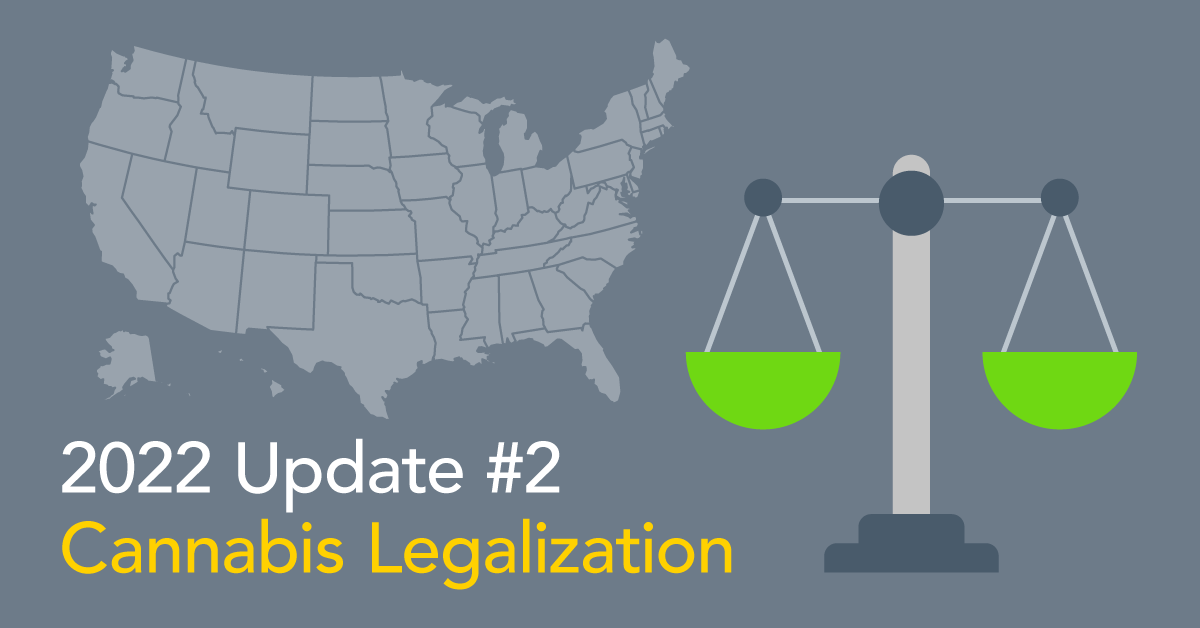
Cannabis Reform: Movement and Stalls Across the U.S.
The second quarter of 2022 is ending, and significant changes across the country show no signs of slowing down. This is also true of the political world, particularly regarding the changing legislative landscape revolving around cannabis.
Since our last update, the most notable change is the legalization of adult recreational cannabis in Rhode Island. On May 25, Governor Dan McKee signed the Rhode Island Cannabis Act,1 which will serve to legalize, regulate, and tax cannabis in the state. This legislation also includes the automatic expungement of criminal or civil cannabis possession charges. While no date is set for when sales will go live, it could happen as early as December this year. Rhode Island is surrounded by New England neighbors Maine, Vermont, Massachusetts, and Connecticut that have also passed laws fully legalizing cannabis.
NY + NJ
Last year we saw adult recreational cannabis use become legal in New Jersey and New York. New Jersey, a trailblazer state that legalized medical cannabis in 2010, legalized it for adult recreational use in February 2021. However, it took over a year for retail shops to open, finally going live on April 21 (perhaps coincidentally a day after the celebratory cannabis day of 4/20). The sales thus far have been impressive, with $3.5 million in sales within the first three days alone and $24 million in sales within the first month.
Neighbor to the north, New York, legalized cannabis for adult recreational use in March 2021, but sales have not yet gone live, and dispensaries have not yet opened. Regulators are anticipating sales may not begin until 2023.
SOUTH
Not typically considered as much of a conservative “red” state as its neighbors, North Carolina is in the midst of a vote regarding the legalization of medical cannabis in the state. The full state Senate has passed the N.C. Compassionate Care Act,2 sending it to the House of Representatives. The likelihood of passing is hard to predict, with House members casting doubt on whether they will support the bill as-is. Neighboring South Carolina has also continued struggling to adopt medical cannabis legalization legislation, with the most recent defeat in May.
Kentucky, meanwhile, is finding its legislative efforts at odds with the desires of the governor and most constituents within the state. A medical cannabis legalization bill passed the House earlier this year but did not get the Senate support needed to advance this session. With polls indicating over 90% of adults in the state support medical cannabis, Governor Andy Beshear earlier this month issued an executive order that would create the Kentucky Medical Cannabis Advisory Committee.3 This committee would serve to help advise on how to pave the way for patient access while waiting for the legislature to take action.
MID-ATLANTIC
The Maryland legislature is still working toward what seems like an inevitable come November, when voters will decide on recreational adult cannabis use within the state. This would amend the Maryland Constitution and would necessitate a barrage of other legislation to allow for sales. The unknown was how this would be addressed by Republican Governor Larry Hogan. However, he has already approved a companion implementation bill and stated he will not stand in the way of legalization if voters approve the reform this election season.
In contrast, despite efforts to legalize and regulate cannabis for adult use, Delaware’s efforts have stalled. The bill received a majority House vote and was poised to potentially become the next state to legalize cannabis for recreational adult use. However, Governor John Carney rejected the bill with a veto, effectively bringing that trajectory to an abrupt halt. While his opposition to cannabis legalization is well documented, it is in opposition to what a majority of voters have indicated they support in polling.4
The Washington, D.C. City Council has also been busy, recently approving a bill that would ban most workplaces from taking adverse action against employees for using cannabis. This is being viewed as an expansion of previous legislation meant to protect government employees from discrimination due to the use of medical cannabis. Exceptions in the legislation are carved out for certain roles, including safety-sensitive positions, police, or those that require a commercial driver’s license (CDL). The bill now heads to Mayor Muriel Bowser.
FEDERAL EFFORTS
Senator Chuck Schumer is continuing efforts to legalize marijuana on the federal level via the Cannabis Administration and Opportunity Act,5 which he sponsored with Senators Ron Wyden and Cory Booker. Incorporating feedback from their congressional colleagues, it is expected the final legislation may be filed as early as this month. It is unknown what will be included in the final version of the reform, but it will likely encompass provisions to address both banking and expungements.
If you’d like to receive legislative updates like this one and other Hound Labs’ blogs straight to your inbox, sign up for our weekly blog email. For daily insight into cannabis reform, be sure to follow us on LinkedIn and Twitter.
Footnotes
1 The Providence Journal
2 The News + Observer
3 Kentucky.gov
4 Civiqs
5 National Law Review

June 30, 2022
By JESSICA COHEN TAUBMAN
Share












